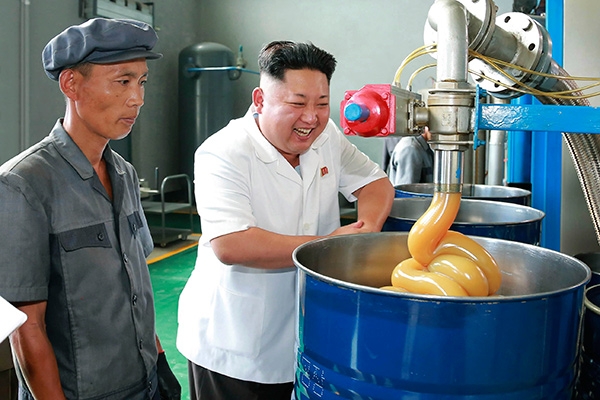Photo: KCNA / Reuters
North Korea is a country highly sensitive. However, the situation is gradually changing. Information about conflicts in the corridors of power, not to mention the state of the North Korean military-industrial complex, remained secret behind seven seals. But formally, the content of those secret decisions that affect the lives of millions of citizens, it becomes known fairly quickly. So it was with the decree of the Central Committee of the KWP and the Cabinet of the DPRK, adopted on 30 may and on changes in North Korean state economy. With this document were shared with dozens, if not hundreds of thousands of managers, and there is nothing surprising in the fact that the essence of the decree, known as the “may 30 measures” now being discussed all over the world. And there is talk about this: “may 30 measures” indicate that the DPRK launched a major economic transformation, fraught with political implications.
Actually cautious economic reform measures in North Korea for the third year. The traditional view of North Korea as about reserve of Stalinism has long been hopelessly obsolete, though still actively being reproduced by the world’s media. In the early 1990s, North Korean state industry, suddenly left alone, without Soviet subsidies, collapsed. The majority of businesses has stopped working, the volume of industrial production for the period 1990-2000 decreased about two times. The lack of fertilizers and the collapse of irrigation systems due to the lack of electricity has led to the fact that agriculture, the already highly inefficient, collapsed. Famine broke out between 1996 and 1999.
However, in the face of economic catastrophe arose and quickly began to develop the private sector of the economy of North Korea. The North Koreans looked for various ways to earn a living. Farmers illegally cultivated fields on mountain slopes, and the workers used made from plants materials in order to produce consumer goods. All who could, rushed to trade, and those who had nothing to trade or nothing, in search of work moved through a poorly guarded border to China. In the 2000s, in the country there were private restaurants, private transport companies and even private mines and factories (they are formally registered as public). It is the growth of the private sector, along with natural changes in the economy and successful state games of North Korean diplomats, has led to the fact that the country has gradually emerged from the crisis.
However, despite the natural growth of private enterprise, the government of the late Generalissimo Kim Jong Il did not dare to go the way of China. This was due to fears of political consequences of market reforms of the Chinese sample. The country’s leadership believed that radical economic change provoke a destabilization of the political system, which ultimately will lead to the collapse of the regime.
However, it seems that Marshal Kim Jong UN and his entourage for a different opinion. Since coming to power in December 2011, the third ruler of the Kim dynasty gently turns the country towards reforms — are not weakening the political control and fiercely suppressing any ideological deviations.
The first step was taken in the spring of 2013, when it joined the so-called “guidance on June 28” (Marshal Kim gave them back in 2012). “Instructions” included in the agricultural cooperatives allowed the creation of small production units of 5-6 people. At first glance, is a pure formality. However, in reality, this meant that henceforth the Korean peasant family may register as a production link. In addition, it was announced that the production units (read — peasant households) will be working on the same site cooperative field for several years and, most importantly, they are allowed to keep 30 percent of the harvested crop. In other words, we are talking about partial privatisation of agriculture — while maintaining all ideological fictions (as in earth give “temporary use” of the production link and not, God forbid, the property of a peasant family).
These innovations are very similar in the Chinese reforms of the late seventies. As conversion in the PRC, they have been extremely effective. 2013 is the first year that North Korean agriculture was working on the new system. As you might expect, he was a record harvest, that this country has not seen a quarter of a century.
Skeptics argued that the peasants were just lucky. Indeed, weather has contributed to agricultural success. The current year started with drought in recent times would certainly have led to starvation in the North Korean provinces. However, working on a new system of agriculture seems to have coped with the crisis. According to preliminary estimations, the harvest of 2014 will not be as rich as last year’s, but still good.
Inspired by the success of authors “may 30 measures” decided to develop the principles laid down “guidelines on 28 June”. New initiatives is even more radical that was made in 2013 and 2014. In particular, from 2015, North Korean farmers will be allowed to keep not 30, but 60 percent of the harvested crop. In addition, farmers will be able to get huge by North Korean standards garden plot area of 3300 square meters per family.
To understand how serious this measure, we must bear in mind that in North Korea, unlike other socialist countries, farmers of small plots in many cases have not relied at all. Where plots are still issued, their area was limited to 100 square meters.
Even more significant changes in the industry, where from 2015 we are introducing a system of individual liability of Directors. Heads of the enterprises will receive unprecedented freedom in addressing economic issues. In particular, they will be given the discretion to purchase components and materials to enter into contractual relationships with design organisations and, most importantly, hire and fire staff.
It is envisaged that the Director will be able to assign wages to employees at its discretion. Some of those businesses that on a pilot basis are already working on the new system, salaries reach absolutely astronomical, by local standards, values. For example, at a mine the drifters get about 350 thousand North Korean won (about 60 dollars) a month. For comparison, the average salary in the public sector now 2-3 thousand won (less than 50 us cents).
In addition, Directors can find potential buyers for their products both inside the country and abroad. The monopoly of foreign trade, so common to socialist countries, the DPRK has not existed before, but this time we are talking about full liberalization. Now the main obligation of the state to make regular set payments to the budget (that is, to pay the analog of the corporate tax), as well as to ensure that the party and ideological work among the staff was conducted as follows.
“May 30 measures” go well with other innovations. On the one hand, the North Korean delegation will travel around the world in search of potential investors (however, for political reasons they ignore China, which is actually the most appropriate source of investment). On the other hand, after coming to power, Kim Jong-UN North Korean individual entrepreneurs breathed a sigh of relief. During the reign of Kim Jong-Il from time to time, had conducted campaigns to combat privateers. In recent years, local authorities secretly ordered to belong to the private sector of the economy tolerate and even to encourage its growth.
The latter is especially important, because the North Korean model, for all its similarity with the Chinese, does not provide any political or ideological concessions. Kim Jong-UN and his advisers are well aware that the neighborhood is rich in South Korea is a potential threat to the stability of the regime. There are not two other bordering States, which difference in GDP per capita would have been equally striking, as the two Koreas. If you believe the pessimists, the gap is a forty-multiple, but if the optimists — fifteen times. Policies of openness can lead to the fact that citizens of the DPRK will start to think why they don’t live as their neighbors, subsequently making the conclusion that the fault of the ruling regime. To prevent this, Pyongyang intends to maintain tight control over the masses. For example, the country began a campaign against South Korean and other foreign TV series and movies, since the late 1990-ies in a large number of penetrating to North Korea. In the last few years has been partially to close the border with China, which for many decades was transparent and easily crossed by smugglers and illegal immigrants who went to China in search of work.
Finally, the Pyongyang rumor about the killings of members of the elite who had displeased Kim Jong-UN. Regardless of their degree of truthfulness to the population of those reports like: people generally tend to believe in a just king and was glad when the aforesaid king of spades throws Riflemen presumptuous nobleman.
Now, policy easing should not wait — at least for the foreseeable future, but in the economy the situation changes. Albeit late, albeit very slowly, but North Korea takes the path of authoritarian market reforms, choosing a model, brilliantly deployed in China and Vietnam. Will the Marshal Kim Chinese to repeat a success or, conversely, confirmed the misgivings of his father, Generalissimo Kim, who believed that the market reforms would be a domestic political crisis and the fall of the dynasty? Maybe Kim Jong UN will eventually change his mind and stop the running process, which it considered too politically dangerous? The answers to these questions will give only time.









